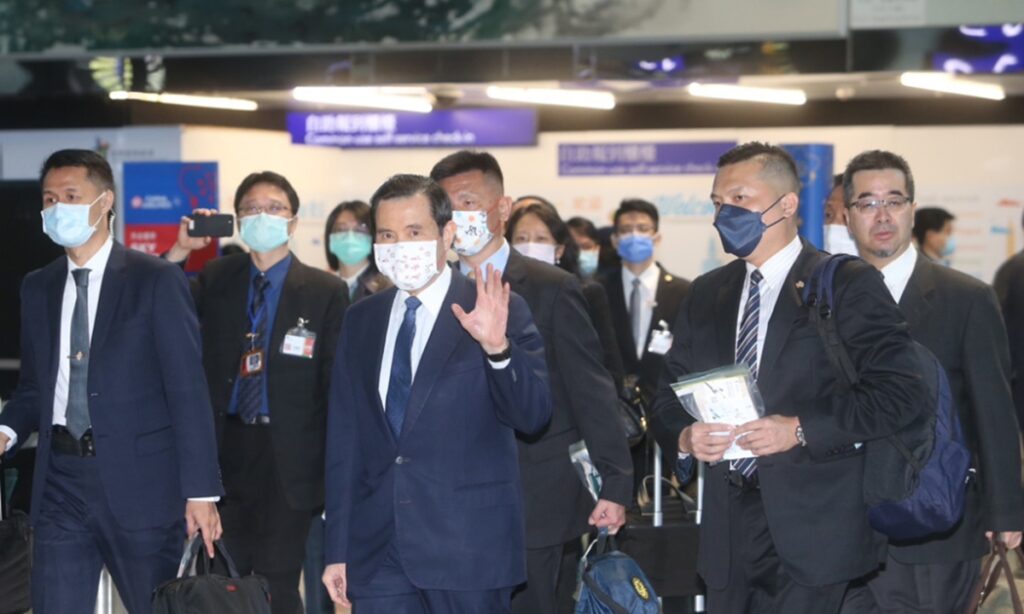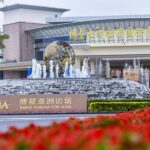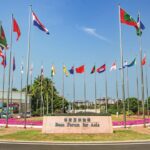Former Taiwan regional leader Ma Ying-jeou landed in Shanghai on Monday afternoon, kicking off an ancestral trip in the mainland, which experts viewed as being of special significance to easing the tensions across the Taiwan Straits and enhancing exchanges. Furthermore, Ma’s itinerary shows the deep historical, political and cultural ties between Taiwan and the mainland, outlining the fact that the two sides of the Taiwan Straits belong to one and the same China.
The first ever mainland trip by Ma, former president of the Chinese Kuomintang (KMT) party, is also the first to the mainland by a former Taiwan regional leader since 1949.
Ma arrived in Shanghai Monday afternoon and then left for Nanjing. He was greeted by Chen Yuanfeng, deputy director of the Taiwan Work Office of the Communist Party of China (CPC) Central Committee, and senior officials from CPC Shanghai Municipal Committee at the airport.
Ma will pay respects to his ancestors on the Qingming Festival, or Tomb-sweeping Day in Changsha, and lead a group of Taiwan students for communication and exchange activities in the mainland cities of Nanjing, Wuhan, Changsha, Chongqing and Shanghai.
They are also scheduled to visit historical sites where the KMT participated in the War of Resistance against Japanese Aggression (1931-45), including Sihang Warehouse Battle Memorial in Shanghai, Memorial Hall of the Victims of the Nanjing Massacre by Japanese Invaders in Nanjing, and the Chongqing Anti-Japanese War Heritage Museum.
Zhang Wensheng, deputy dean of the Taiwan Research Institute at Xiamen University, told the Global Times that as an ancestral trip, Ma’s mainland visit reflects the history, culture and reality of the shared origin of the Chinese people on both sides of the Taiwan Straits, which cannot be erased by the Democratic Progressive Party (DPP)’s de-sinicization and anti-mainland manipulation, Zhang said.
In addition, visiting the memorial halls to review the history of the two sides’ joint fight against foreign aggression and safeguarding national sovereignty and territorial integrity is of positive significance to bringing the Chinese people on both sides closer, especially in the face of the DPP’s attempts to cut the historical connection between the two sides of the Straits and deliberately whitewash the history of Japanese colonial rule, according to Zhang.
Before leaving Taipei, Ma told Taiwan-based media on Monday that the trip is his first visit to the mainland. Ma, 73, said he was dealing with cross-Straits affairs at the age of 37, and has waited 36 years for the opportunity to visit the mainland.
According to Ma, taking college students for exchanges this time can improve the cross-Straits atmosphere, and will help resume dialogue and enhance goodwill.
Ma’s trip brings up memories of our history and prospects for our nation’s future, Wang Yingjin, director of the Center for Cross-Straits Relations Studies at the Renmin University of China, told the Global Times.
The mainland always welcomes and supports the young people in Taiwan to more actively integrate into the mainland’s modernization drive and join hands to realize national rejuvenation, Wang Yingjin said. “This trip is significant for inheriting shared memories and developing future ties.”
Ma’s visit came amid an atmosphere of heightened confrontation between the two sides of the Taiwan Straits. It coincides with Taiwan regional leader Tsai Ing-wen’s upcoming and provocative stopover in the US en route to Latin America, and just one day after Honduras announced it was cutting ties with Taiwan authorities and establishing official diplomatic ties with the Chinese central government.
Ma’s visit to the mainland reflects public calls in Taiwan for peaceful development, Zhang said. “It will be of benefit to offsetting the negative impact of the current high confrontation between the two sides provoked by secessionist DPP operations and stabilize cross-Straits relations to some extent.”
The epidemic and the DPP’s obstruction have brought cross-Straits exchanges to a virtual standstill for three years. Ma’s visit will further open the door to exchanges and cooperation, Wang said.
The high-level reception shows the mainland’s recognition and rewarding of Ma’s contribution to cross-Strait relations and strong support for exchanges between the two sides, said Wang Jianmin, a senior expert in cross-Straits affairs at Minnan Normal University in Fujian Province.
During Ma’s eight years as Taiwan’s regional leader (2008-2016), the two sides held 11 high-level talks and signed 23 agreements in fields ranging from economy and tourism to flights.
Although Ma faced a huge amount of disruption from secessionists in the latter part of his second term, which damaged his popularity, in contrast with Tsai, who has actively colluded with anti-China forces in the US and pushed Taiwan to the brink of military conflict, many people have begun to miss the peaceful development seen between the two sides during Ma’s era, Wang Jianmin said.
Ma’s mainland visit will further awaken and refresh the memories of this peace dividend, he added.
According to a recent online poll conducted by Taiwan-based media, 77 percent of respondents said they were optimistic about Ma’s visit.
(Global Times)




